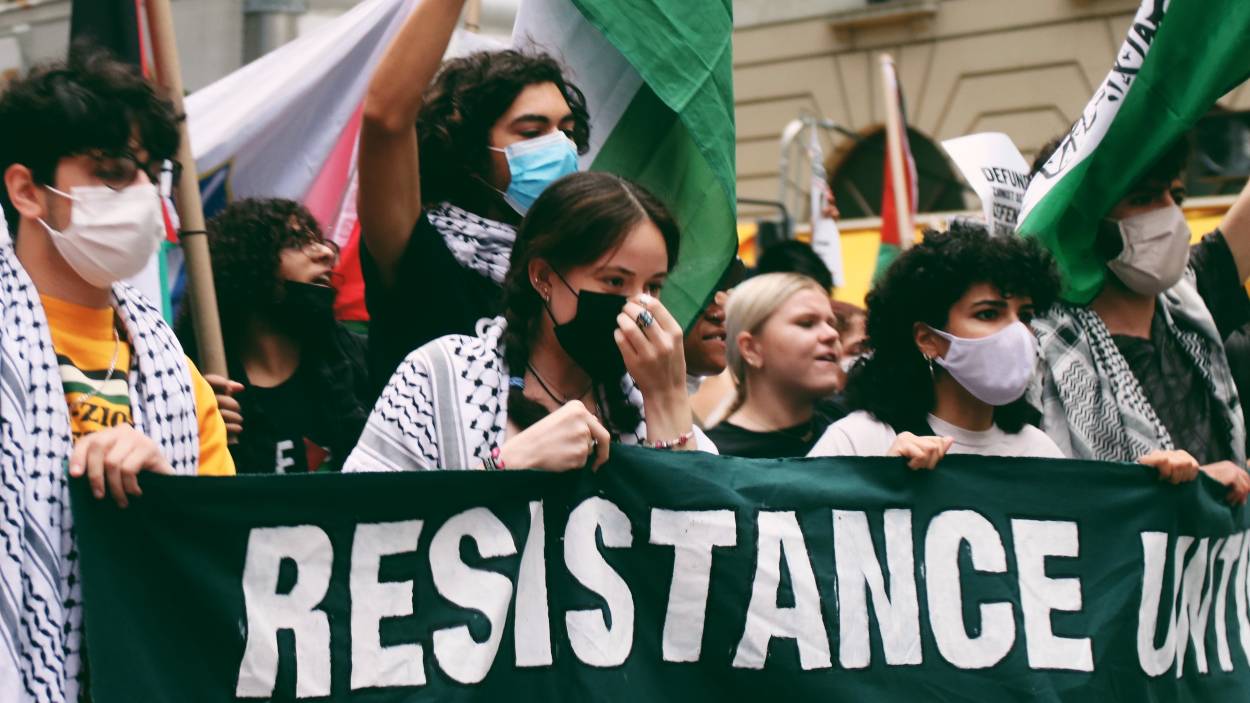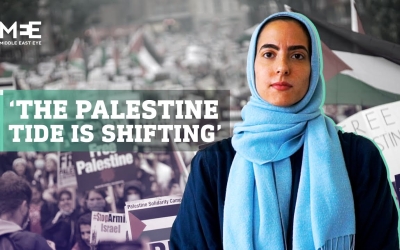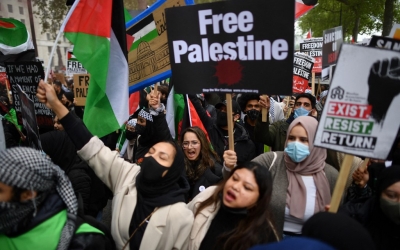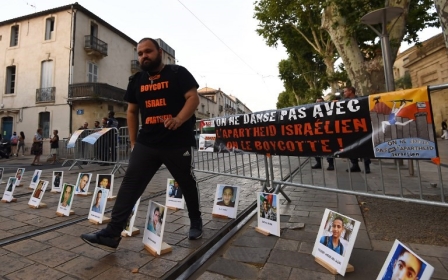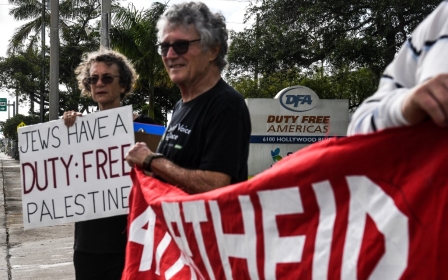Pro-Palestine activists brave smear campaigns at US universities
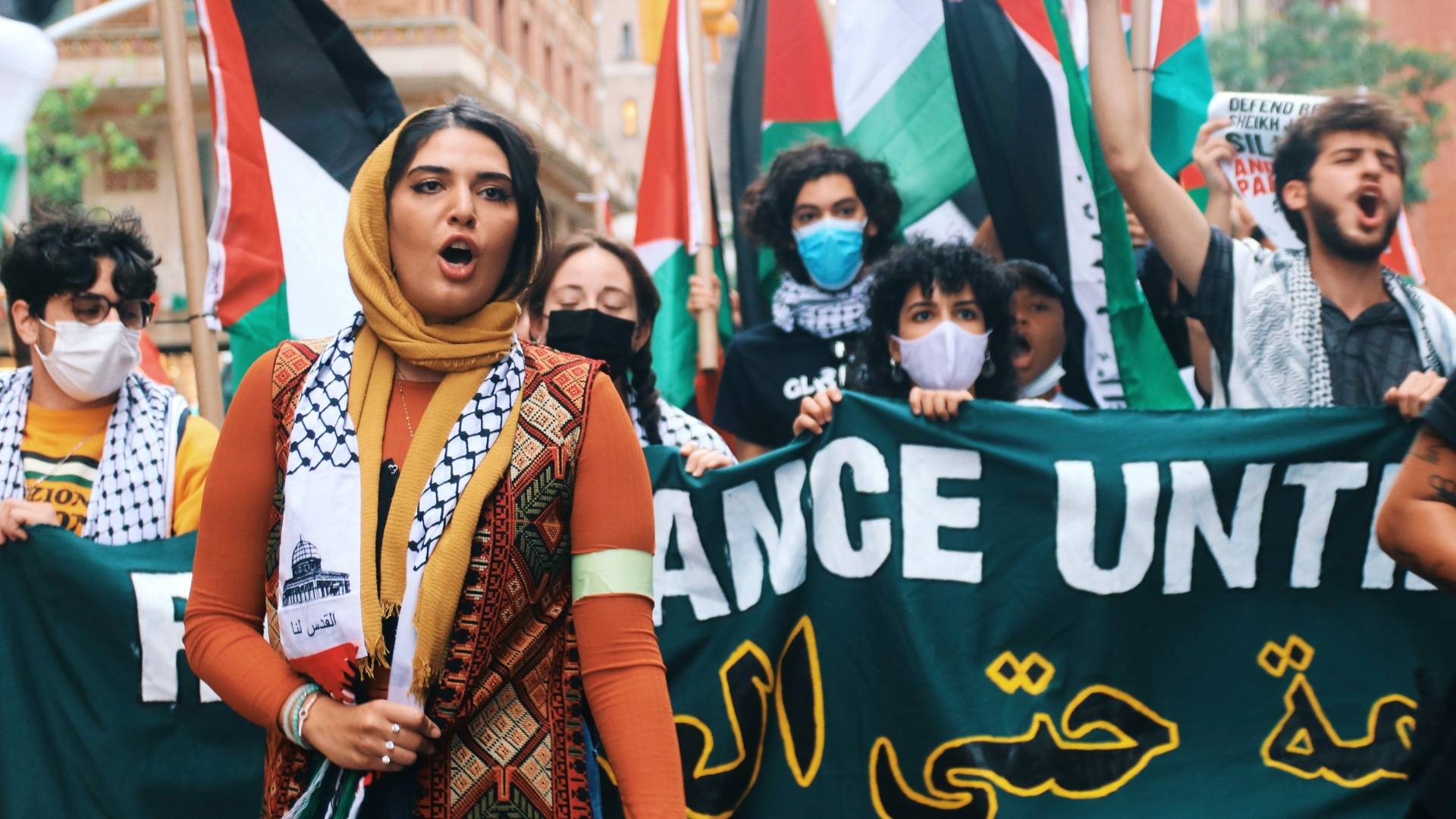
As a part of her Palestine-related activism, Amira* would frequently attend protests outside the John Jay College of Criminal Justice at the City University of New York.
She would stand in the rain with hundreds of other students, calling on the university to divest from companies that support Israel. Her voice would grow hoarse after chanting for a few hours but she'd still take part, albeit a clear distance away from the cameras and even though her face was concealed with a Covid-19 mask.
While Amira attended various other protests and supported her activist classmates, she was afraid. And for many other students at New York college campuses involved in pro-Palestinian activism, the fear was palpable.
'As a Palestinian, I see it as my responsibility to continue the struggle that those before me have endured'
- Nerdeen Kiswani, activist
"Sometimes I'd feel awful for being so afraid. People are dying in Palestine and I am the one who is afraid for myself and my future all the way across the world," she told Middle East Eye.
"I wish I could grab a microphone and sign petitions and go inside my college president's office and demand change. But I know exactly what happens to students who do."
New MEE newsletter: Jerusalem Dispatch
Sign up to get the latest insights and analysis on Israel-Palestine, alongside Turkey Unpacked and other MEE newsletters
For many students, the fear is associated with being placed on websites such as Canary Mission, dedicated to demonising pro-Palestinian students.
The initiative, which operates anonymously, blasts students and faculty who criticise Israel with accusations of antisemitism and supporting terrorism. With more than 24,000 followers on Twitter, it uses its reach to suppress pro-Palestine activism.
Several university students told MEE that the possibility of being added to such websites had forced them to temper their activism, as it could cause issues with university hierarchies and potentially hinder future job prospects.
Earlier this year, when two weeks of violence left hundreds dead and thousands more injured across the occupied Palestinian territories, protests erupted in western capitals including London, Washington and Canberra, with hundreds of thousands demanding an end to the hostilities.
Nerdeen Kiswani - who just months before became a target of a smear campaign - was among those who protested, taking to the streets of Brooklyn to demand an end to Israel's offensive.
Chanting at rallies was nothing new for the young Palestinian New Yorker.
A student at the City University of New York (CUNY) School of Law, she was the founder of Within Our Lifetime (WOL), an organisation she established in 2015 after realising there was not a youth-led grassroots organisation fighting for the Palestine cause.
But for students such as Kiswani, being vocally pro-Palestinian came with a price.
Last year, Kiswani was labelled "Antisemite of the Year" by Stopantisemitism.org. "Too many antisemites like Kiswani are spreading their radical hate through mainstream sectors, from education to law, by disguising it as criticisms of Israel," was the reasoning given for the designation.
In September 2020, Kiswani had posted an old video of her waving a cigarette lighter while criticising a friend for wearing a T-shirt promoting the Israeli military.
Shortly thereafter, according to advocacy group Palestine Legal, Act.IL - an app affiliated with the Israeli government - rewarded hundreds of users if they sent pre-scripted emails to the CUNY administration, falsely claiming that Kiswani threatened a student and calling for her to be punished.
The campaign against her went on for months, and eventually, after mounting student pressure, the CUNY School of Law issued a statement in her defence, saying: "The Law School supports the free speech rights of Nerdeen Kiswani, other Palestinian students, and their Jewish and non-Jewish allies, who have been vilified for their activism."
Kiswani told MEE: "My grandma used to tell me the stories of her during the Nakba having to walk to Jordan. She always prayed everyday that she wanted to see Palestine free in her lifetime.
"As a Palestinian, I see it as my responsibility to continue the struggle that those before me have endured. Now that my grandma is gone, it is on me to continue the fight myself and to pass it on to the next generation, which is what we're doing through WOL."
'Threat of Canary Mission was always there'
While only a handful of student activists are subjected to smear campaigns such as the one against Kiswani, many do end up on the Canary Mission website.
The site puts together profiles of pro-Palestinian activists and labels them racists, antisemites and supporters of terrorism.
One student described the site to MEE as a "McCarthyist organisation that attempts to silence Palestinian activists".
Canary Mission says that "by shining a light on hate groups and their members, the public is better informed about bigotry on their campuses and in their communities".
"Canary Mission believes that we all have the right to know if an individual has been affiliated with movements that routinely engage in anti-Semitic rhetoric and actions, promote hatred of Jews and seek the destruction of Israel."
According to The Intercept, the blacklist has become particularly frightening because it's used by law enforcement in Israel and the United States.
Palestinian rights advocates have been interrogated and deported from Israel because of their Canary Mission profiles, while others have been interrogated by the FBI.
Some of the students who had been blacklisted told MEE that their universities needed to do more to condemn the stifling of free speech and protect the right to protest in support of issues such as Palestine.
Bayan Abubakr, who graduated from New York University (NYU) in 2019, said that while she was on the periphery of the Students for Justice in Palestine (SJP) society, she still ended up on Canary Mission's site.
Abubakr said she appeared in the website's crosshairs after she co-sponsored a resolution on the human rights of Palestinians, which was ultimately passed at the first undergraduate student level.
"It's the university's responsibility to protect students because ultimately we are students of the university and there are multiple threats on campus to our safety," she told MEE.
"At the very least, the university needs to condemn the actions of Canary Mission."
The forces of censorship
Several of the students who spoke to MEE said while there was a lingering fear of being blacklisted, they were buoyed by notable professors and academics backing their activism.
In 2016, more than 1,000 faculty members across several US universities signed an open letter condemning the Canary Mission blacklist.
Palestine Legal, a non-profit that represents students, professors and grassroots activists that have been punished, censored, or falsely accused for standing up for Palestinian rights, said it had seen an uptick in suppression in recent years.
"A lot of people are interested and paying attention to Palestine because of recent events. Just regular people who are upset about human rights abuses... [and because] their employers were making statements in the wake of George Floyd's murder, in support for Black lives… [because] a lot of people felt like this was a work environment that cares about social justice," Radhika Sainath, senior staff attorney at Palestine Legal, told MEE.
"So they made statements in support of Palestinian lives and were reprimanded, and in some cases, fired."
Sainath said Palestine Legal responded to 213 incidents of suppression of US-based Palestine advocacy in 2020. From 1 January 2014, through 31 December 2020, the organisation had responded to a total of 1,707 incidents.
"More people than ever are joining this growing movement for Palestinian freedom and that's exciting to see," she said, "but in turn, we're seeing the forces of censorship grow as well for people who don't want change over there."
Zachary Lockman, a professor of Middle Eastern and Islamic Studies at NYU, agrees. He also believes that universities need to protect their students and faculty.
"Universities need to be speaking out against operations like Canary Mission, and at minimum, denouncing them publicly. When something's online, it’s very hard to get rid of it," he said.
"They need to be consistent and defend the rights of students and faculty to express their political views."
Middle East Eye reached out to Canary Mission for comment but did not receive a response by the time of publication.
*Some names have been changed to protect identities
Middle East Eye delivers independent and unrivalled coverage and analysis of the Middle East, North Africa and beyond. To learn more about republishing this content and the associated fees, please fill out this form. More about MEE can be found here.


